We have all experienced first-hand the differences between representatives of various generations. Talking to our grandparents, parents, and sometimes even siblings (if the age gap is significant), can often feel like a collision of two worlds. Diversity is beautiful, and those differences in viewpoint add flavour to our everyday interactions.
The workplace is no different - we live at an exciting time when four generations are professionally active. If going through a family dinner without engaging in an inter-generational fight can sometimes be challenging, imagine managing an office full of employees of all ages.
Therefore, to make sure the coexistence at the workplace goes smoothly, it’s crucial to know exactly what each generation expects of their job - both as their manager and as their colleague.
We’re building a bridge across generations by explaining some of the professional preferences of each age group. As Generation Z is probably the most mysterious one so far, and taking into consideration the growing interest it’s spiking all across the globe, we will focus on that particular group a bit more than others (whom by now we all know a bit better).
- Company's values
- Career growth opportunities
- Wellbeing and mental health support
- Flexibility
- Honesty and transparency
- Loyalty
First, let’s make sure we’re all on the same page when it comes to the age brackets of each generation - they can sometimes vary, depending on the source, so below you can see the data we will be using for the purpose of this article. What’s more, you can also note the current percentage of each generation in the workforce:
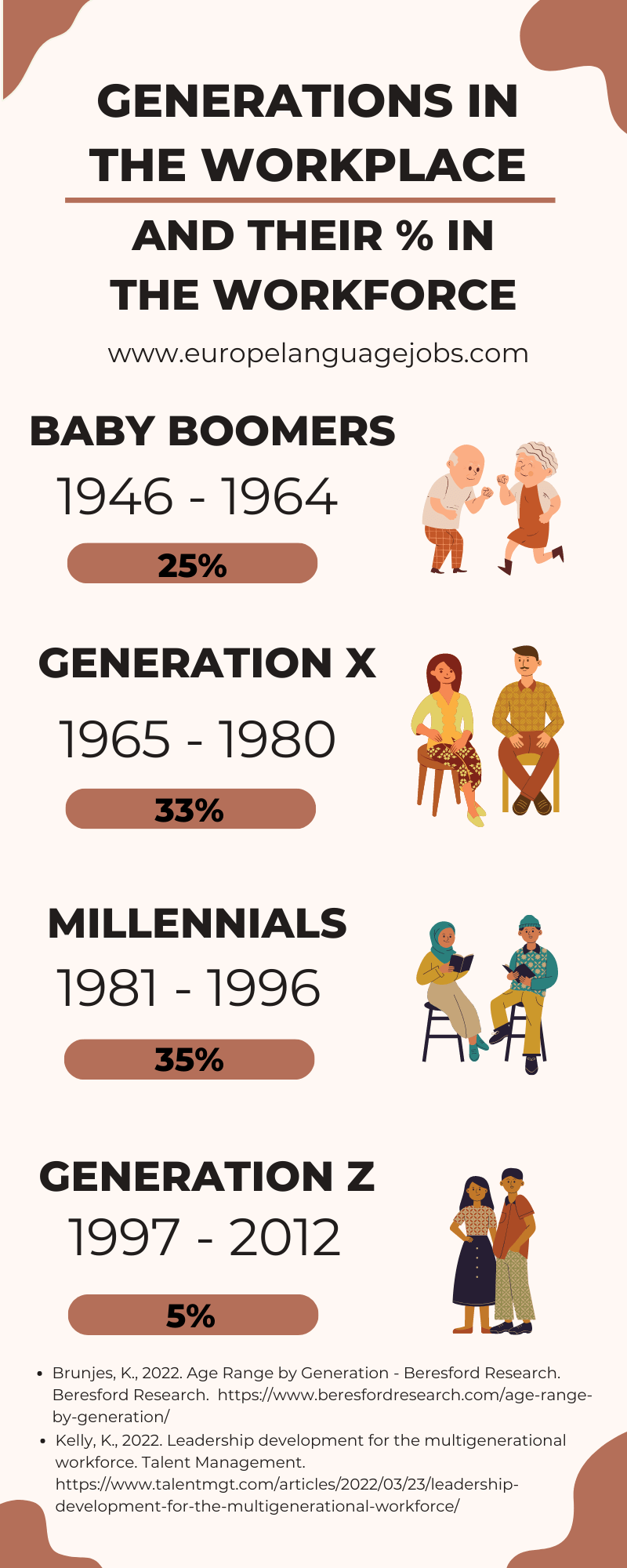
*please note that the data concerning the percentage of generations in the workforce is based on a study carried out in the USA in 2022. We have not been able to find any up-to-date information of this sort from Europe, and we believe it is better to demonstrate American data from this year, rather than European from 6 years ago (this is a relatively long time when age groups are concerned).
Keep in mind that we’re not including the generation of Traditionals (born between 1928 and 1945) in our research. We are aware some other studies still take it into consideration. However, our article concerns generations that are still professionally active, and at 77 to 94, we think it’s safe to say that this group is already enjoying its hard-earned retirement (or at least we sincerely hope so!).
Now, after this lengthy introduction (sorry!), we’re ready to discuss what generations value the most about their workplace!
1. Company’s values
Baby Boomers have been tagged the “Me Generation” - and given the circumstances in which they had to grow up, we don’t blame them at all.
In return, their grandchildren are about to be remembered as the ones who opened their eyes to what’s around them. Mainly, issues such as environmental protection, diversity, and equality.
According to a study by Deloitte, 37% of Gen Zers and 36% of Millennials have turned down a job or an assignment that didn’t align with their personal values. We are dealing with a global phenomenon known as The Great Resignation - young employees are collectively leaving workplaces that don’t fulfil their requirements or whose actions don’t fit into their personal beliefs.
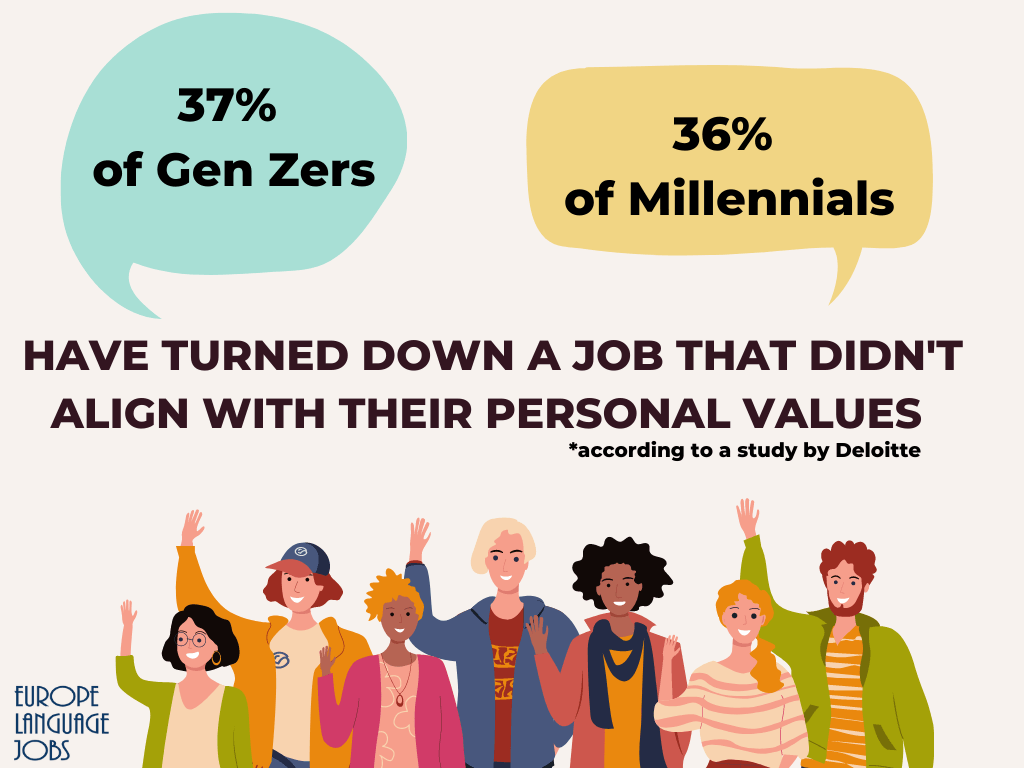
Perhaps this willingness to leave a job due to ethics bigger than demonstrated by Generation X and Baby Boomers is the result of the current diversity of the job market. The vacancies are so numerous and so varied, maybe Gen Zers and Millennials no longer feel like they need to hold on to a job that doesn’t agree with them so tightly.
We’re not saying that finding a new job is always a piece of cake (unless you do it with Europe Language Jobs, of course), but we believe that candidates nowadays have more freedom to job-hop than their parents did.
What does that mean for companies? Well, employers, you have to be more flexible now than ever. With young talent being picky about who they work for, if you don’t develop quickly enough and adjust your policy to the importance of sustainability, equality, and diversity in the workplace, you might find yourselves short of employees.
And with the power of the Social Media that both Gen Zers and Millennials are fluent in, your reputation could severely suffer if you hold on to ancient ethics systems.
2. Opportunities for career growth
Everyone appreciates a chance to develop professionally and personally - regardless of age. After all, we evolve our whole lives.
However, we have to take into consideration that both Baby Boomers and Generation X have been in the workforce for enough years to understand what their jobs are all about by now.
Keeping up with the world that turns quicker every day and honing new skills is important throughout our whole career journey, so training should be delivered across all age groups. What matters is the kind of things we wish to learn.
Unless we are dealing with career change - which nowadays is becoming a more and more popular phenomenon - those who need an introduction into the profession are Gen Zers and younger Millennials. They expect a well-carried out onboarding process filled with training, courses, and coaching.
While Gen Z is well on its way to beating Millennials for the title of the most educated education *ever*, universities don’t always teach the practical aspects of a job. Many recent graduates enter the job market with *a lot* of theoretical knowledge, and little to no practice, so they need the initial support to understand their tasks and goals in the new role.
The data speaks for itself: a study by Gallup revealed that while only 18% of Baby Boomers and 31% of Gen Xers say that they would prefer a job that accelerates their career growth, nearly half of Millennials (45%) agree with that statement.
As Baby Boomers are close to retirement, they hardly have their sights set on future career prospects. What matters to them at this point is financial stability and appreciation for doing their best.
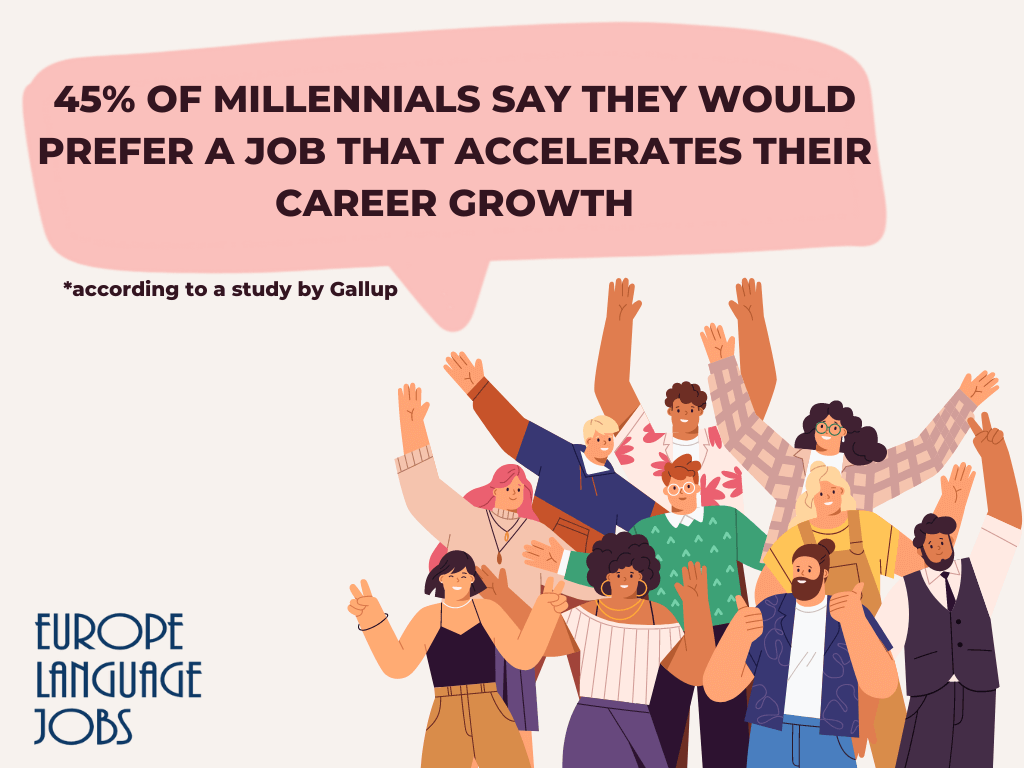
The good news for employers is that young talent most often already has the hard skills their parents didn’t always possess starting work. Some Millennials barely remember life before computers and the internet, and Gen Z doesn’t remember those times at all.
That means they have grown up accustomed to the wonders of technology and come armed with the knowledge of various programmes and systems. They could probably teach you more about technology than you could teach them, so you’ll be able to invest their time into honing other skills necessary for the job.
3. Wellbeing and mental health support
Again, wellbeing is definitely important for all generations, but it hasn’t been stressed just how much until the younger generations entered the workforce.
Gen Z has been announced the most anxious generation. Maybe it’s because young people feel overstimulated nowadays - the flood of news, good and bad - coming from all directions and staying constantly connected with others through the Social Media without a real break to take a breath can definitely be overwhelming.
Or perhaps the reason is simply that the youth are more accustomed to speaking up about their mental health than their parents and grandparents.
Opening up about issues with mental health is highly encouraged in schools right now. The “suck it up” attitude is no longer all right - when something is wrong, it is recommended to share it rather than grit your teeth and push through.
Still, Deloitte reveals that 46% of Gen Zers and 38% of Millennials say they are stressed most of the time. Top concerns contributing to the accumulation of stress include:
- long-term financial future,
- day-to-day finances,
- health of self and loved ones.
As two of the three stress factors most commonly brought up by Gen Zers and Millenials are connected with finance - and therefore, work - they will pay a lot of attention to the wellbeing services the employers can offer them.
The range of mental health support in the workplace can actually often be the deciding factor in whether a young candidate decides to accept a job offer or not - surveyors definitely put this aspect rather high on their list of importance when looking for employment.
Gallup identified five basic areas of wellbeing:
- career,
- social,
- financial,
- community,
- physical.
A good employer will, therefore, make sure to provide support in more than just one of those areas. For example, attractive training schemes can improve the career wellbeing of employees, while a gym membership card coming with the contract will take care of the physical sphere.
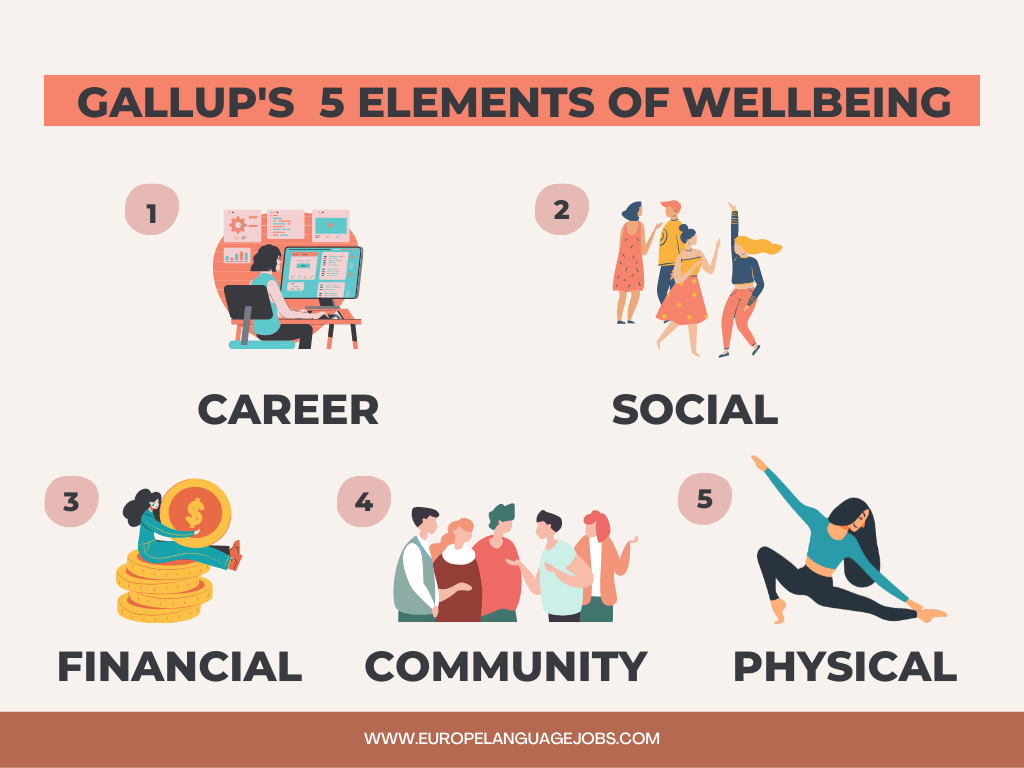
Let’s not forget that those benefits shouldn't be offered just to those who address them. Gen Xers and Baby Boomers might be used to shrugging and saying that “it is what it is”, as this is what the times they’d grown up in demanded of them.
They might not openly speak about the importance of their mental health as willingly as their younger colleagues, but they will appreciate all the support they can get.
4. Flexibility
Gen Zers are not only the first generation to not remember the world without a computer in it. They are also the first generation to have been locked in their houses for two years in the defining stages of their life, and forced to communicate with the outside world solely through Zoom. And, contrary to what others sometimes believe, not all of them were happy about it.
The youngest members of the workforce entered it in tumultuous times - they were either still at university or just starting their first jobs when the pandemic hit.
Therefore, the only professional reality most of them know is talking to a bunch of floating heads on their screens and using solely digital tools. Work from home became “the new normal” just as they were taking their first steps on the career path - and, automatically, it also became the new normal for them.
No wonder, then, that flexibility is something they value more than anything else. After all, this is what they have gotten used to. After we have been proven that remote work is actually possible, more and more employees - and not just the younger ones - expect their workplaces to open up to this new lifestyle.
Flexible schedules, hybrid working models, and the possibility to work from home are slowly starting to climb their way up the ladder of priorities when looking for a job - across all generations.
As the digital nomad lifestyle is also gaining in popularity, more and more people want to avoid being obliged to stay in one place - we have all had enough of that for the past two years.
Employees want the freedom to hop on a plane to Mexico while working at a company located in Austria without the necessity to book days off. Today’s motto is: if a job can be done remotely, it should be done remotely.
5. Honesty and transparency
We all value that. But the youngest of us who have been raised in the era of fake news and gaslighting probably even more so.
Studies clearly demonstrate that what both Gen Zers and Millennials put on a pedestal nowadays are honest, transparent leaders. They need to see facts, data, and third-party validation and are very unlikely to accept information without all three methods of verification.
What Gen Z bring up even more prominently is the clarity of work duties and what the job will involve exactly.
This can be explained by the general confusion caused by their troubled entrance into the workforce. Among the panic, rapid reorganisation within many companies, and the struggle to move life online as fast as possible, fresh employees could have been left without a clear understanding of what their position is all about.
They might have not been given the attention every new worker needs and deserves up until now - hence their willingness to complete training and demand to be given a clear role description.
It’s only natural that those who have grown up knowing the term “fake news” - one that their parents and grandparents didn’t have to learn until recently - since early childhood will stress the importance of honesty and transparency in the workplace now. In order to achieve that, seamless information flow and a clear hierarchy system have to be ensured in every workplace.
6. Loyalty
The last aspect that needs to be discussed when it comes to different generations’ approaches to the workplace is their loyalty. It is commonly said that while Gen Xers and Baby Boomers are loyal to the workplace, Gen Zers and Millennials stay true to their career growth.
That means the second group is more likely to change jobs if that is what they believe to be more contributing to their professional development.
It is true that young employees tend to job-hop more often than their parents and grandparents. According to Deloitte, 40% of Gen Zers and 24% of Millennials have left their jobs within two years in 2022. It can be motivated by the growing concern about the chances of being rehired decreasing as we age.
Additionally, the older we get, the less energy we have to support drastic changes such as changing jobs - at some point, all we need is stability and calmness.
What also falls under the category of loyalty to the workplace is the probability of taking on side jobs outside of the main profession. And, surprisingly, a study by Wonolo revealed that those who appear to be more involved in gigs on their website are… Gen Xers and Baby Boomers!
This can be explained by the anxiety concerning finances growing the closer they get to retirement, and the willingness to earn a little extra cash to sleep better at night.
Gen Zers and Millennials, however, are quickly gaining ground on their parents and grandparents when it comes to side gigs. Deloitte reveals that 43% of Gen Zers and 33% of Millennials have taken a part-time or even full-time position in addition to their primary job in 2022.
The growing inflation and skyrocketing prices of rents leave young people who want to remain independent struggling to make the ends meet. Employees picking up side hustles are not a sign of the lack of loyalty to their primary workplace - it’s simply the sign of the times, ones that are extremely financially challenging.
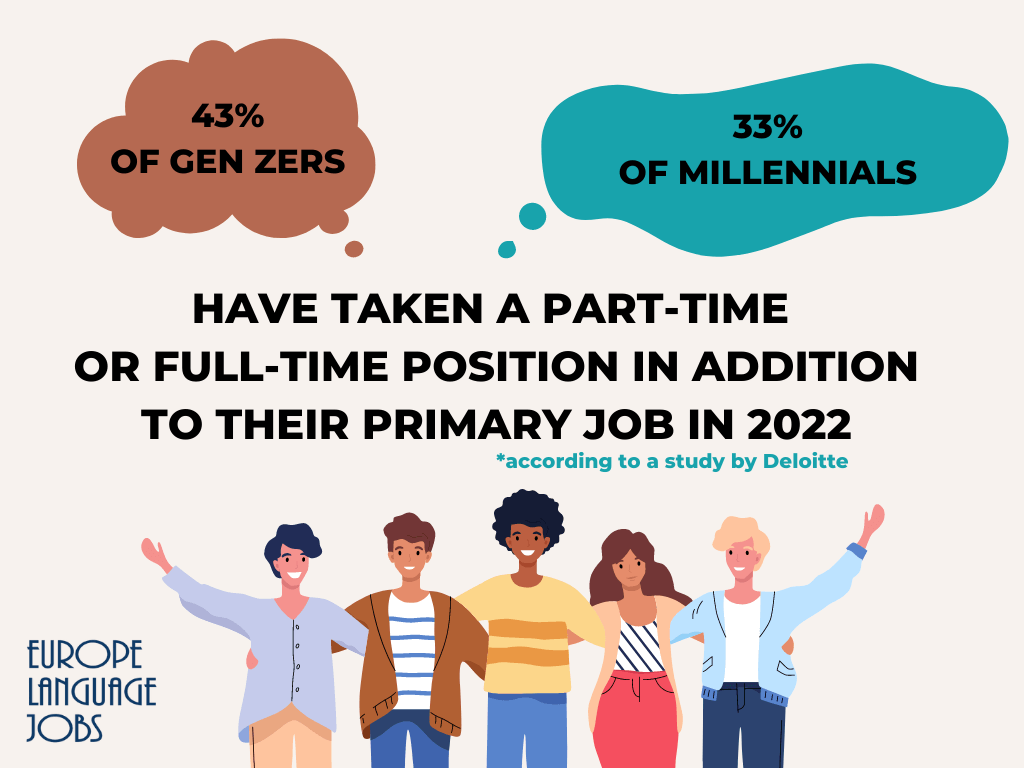
In addition, it must be emphasised that young employees are more adaptable and therefore welcome changes more easily. As a consequence, they are more likely than their older colleagues to embrace changes at the company and fluently transition into the new model.
It is crucial to understand everyone’s objectives in order to make coexistence smooth and pleasurable. We hope that, whatever your age, this article has helped you step into the shoes of the representatives of other generations and look at the world from their point of view.
Of course, we must remember that it’s not about establishing who makes the better employee - the purpose is to understand one another and make note of everybody’s strengths and limitations. Older generations have once been young - and the younger ones will one day be old.
The Alpha generation is growing up, no doubt ready to blow our minds in ways we’re not yet expecting. We’re all in this together, so the more effort we put into getting to know one another, the better!
Feeling inspired? Visit our blog for more career advice! How can you be sure the information we provide is top-notch? We are a group of professionals working with recruiters, career coaches, and HR specialists from all over the world!
Trust our experience and let us help you find a new job in Europe!














Arslen Aissat1y ago
This looks very interesting
This looks very interesting